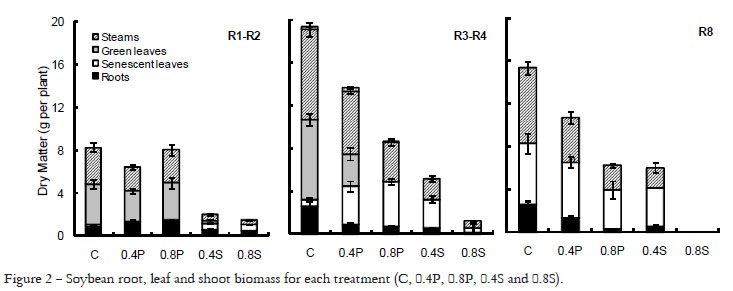The production of soybean (Glycine max L.) has doubled in the last two decades. It is now being grown on both traditional arable lands and on marginal soils, including saline soils, in various parts of the world. Most research on crop tolerance to salinity has been performed using soils with stable levels of salinity. However, there are soils that undergo sudden increases in topsoil salinity for short periods of time. The aim of this study was to compare the effect of stable salinity concentrations with peaks of salinity for their effects on soybean vegetative growth, grain yield, and the accumulation of chlorides. The response of soybean growth was evaluated in pot experiments with the following treatments: Control (non saline soil), soil salinity level of 0.4 S m-1 (0.4S) or 0.8 S m-1 (0.8S), and soil subjected to salinity peaks of 0.4 S m-1 (0.4P) and 0.8 S m-1 (0.8P). The salinity levels were obtained by application of saline irrigation water. Soybean responded differently to stable salinity levels versus peaks of salinity. When salinity was a permanent stress factor, regardless of the salinity level (i.e. 0.4 and 0.8 S m-1), biomass production and differentiation of reproductive organs was greatly affected. For 0.8S treated plants, they never reached the reproductive phase. Conversely, only small differences in growth data were found between 0.4P and Control treatments, although an 80% decrease in yield was associated with the 0.4P treatment. To obtain a reasonable soybean yield, a leaf chloride concentration of 1 mg g-1 of Cl- in dry matter should be considered a maximum threshold.
NaCl; Glycine Max L; saline irrigation; yield loss; chloride accumulation









